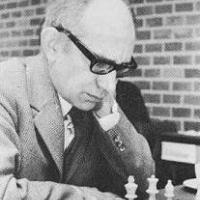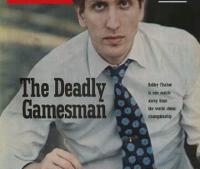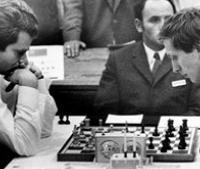
The Walking ECO
Semyon Abramovich Furman was born in Moscow, Russia (formerly USSR). He was a factory worker in Leningrad, who developed his chess skills in his spare time, and was a late bloomer by chess standards, not reaching National Master until adulthood. Furman was an International Grandmaster and a trainer. He is best known for developing Anatoly Karpov into a World Chess Champion, but was a formidable player himself, as well as a successful coach for several other world-class players. His name is sometimes written as Semen or Semion Furman.
His first noteworthy result was when he tied for first place with Konstantin Klaman, with 11 of 15. In Tula, 1945, he finished second with 10.5 of 14, behind V. Lyublinsky. In 1947 he tied for first place in the All-Union Championship of the Spartak Club, with Vladimir Simagin, with 15 of 19, but lost in the playoff match. He qualified from the semi-final at Sverdlovsk 1947 for his first Soviet Chess Championship at the age of 27. In the final, he performed exceptionally well, placing third only a point behind the winners David Bronstein and Alexander Kotov with 11 of 18.
He tied for first-third places at Vilnius 1949, the semi-final for the URS-ch, with 11.5 of 17, again qualifying for the Soviet final. Then, in the Soviet final later in 1949, again in Moscow, he tied for 5th-7th places with 11.5 of 19. In the 1950 Championship of the Spartak Club, he tied for 4th-5th places, with 6 of 11. In the URS-ch at Kiev 1954, Furman scored 10/19 to tie for 7th-9th places.
He earned his first international tournament opportunity for Bucharest 1954, where he tied for 6th-7th places with a fine 10 of 17. He was awarded the International Master (IM) title. He was in the middle of the field in the URS-ch at Moscow 1955, with 10 of 19, in a tie for 10th-11th places. It was a similar story at the URS-ch, Moscow 1957, where he scored 10 of 21 for 12th place. He had a good tournament at Kiev 1957, scoring 11.5 of 19 to tie for 2nd-5th places, behind only Tigran Petrosian. His form dropped for URS-ch, Riga 1958, as he could only make 6 of 18 for 17th place. At URS-ch, Tbilisi 1959, he was again below 50 per cent with 8 of 19 for 15th place. His best result thereafter was placing fourth in the 1965 Soviet Championship with 11.5 of 19.
Bronstein faced Furman in the 1948 Soviet Championship, won the game, but was impressed with Furman's skill. Bronstein wrote, in his acclaimed book The Sorcerer's Apprentice “Later, when I recognized the logical play of Furman, I invited him to be my assistant during preparation for the match [against World Champion Mikhail Botvinnik] in 1951. Also, I took him abroad as my second to the Interzonal Tournament in Gothenburg in 1955 and the Candidates' Tournament in Amsterdam 1956."
Furman had been one of the assistants to Botvinnik in his 1963 world title match against Tigran Petrosian, according to Anatoly Karpov, writing in his autobiography. Botvinnik played many training games with Furman, to prepare for the 1960 and 1961 World Championship matches; these matches only became public many years afterwards, when Botvinnik published the games, which are now available in various databases. Furman and Botvinnik at that time were both members of the Trade Unions Club. Later Furman switched to the Army Sports Club. Furman also assisted world-class players such as Viktor Korchnoi (according to both Bronstein and Karpov) and Efim Geller (according to Karpov).
Furman did not become a Grandmaster until 1966, at age 46, after his fine first place result at Harrachov, with 12 of 17. It was difficult in those years for all the very top Soviet players to travel abroad to international tournaments, where titles could be earned, and Furman had few opportunities. He did play for the USSR in the 1961 European Team Championship at Oberhausen on board ten, scoring 4 of 7, and contributing to the overall gold medal team victory.
As Karpov built further successes, Furman competed with him sometimes in the same international tournaments, such as Madrid 1973 with 10 of 15, Ljubljana/ Portoroz 1975 with 9.5 of 15, and Bad Lautenberg 1977 with 9 of 15, all of which Karpov won. Furman also performed well, taking or tying for third place at all three.
Furman was an exceptional openings specialist, and was respected as being of virtually world-class strength with the White pieces, with which he scored most of his wins over the top players, as the game selection shows. He was sometimes referred to as "the world champion when playing White." He could not score anywhere near as well as Black, and this held back his success. While best remembered today as Karpov's trainer, Furman also made many important contributions to the success of other top players, such as Bronstein, Botvinnik, Korchnoi, and Geller. He developed several significant improvements to opening theory. He favored the closed openings (1.d4, 1.c4, 1.Nf3) as White and in many of his wins over top-class rivals, his opponents were simply unable to generate counter play, and were slowly strangled by Furman's precise, yet amorphous strategy. Karpov noted that a book on Furman's career and best games would be well-received and valuable; but no one has yet taken up this challenge.
He passed away in Leningrad in 1978 after suffering a heart attack.
.






